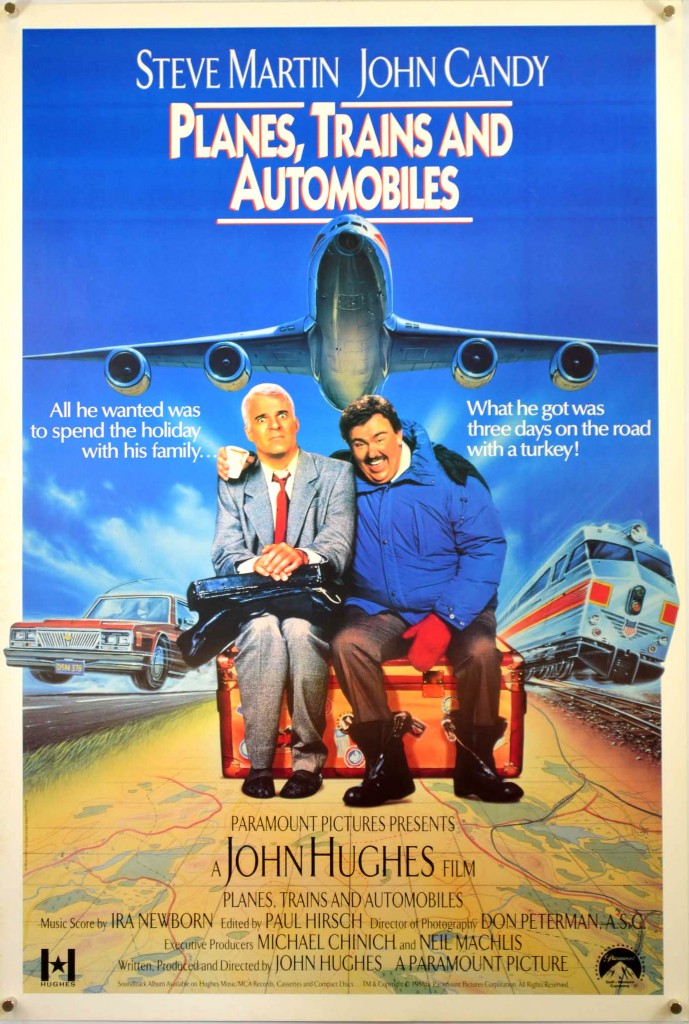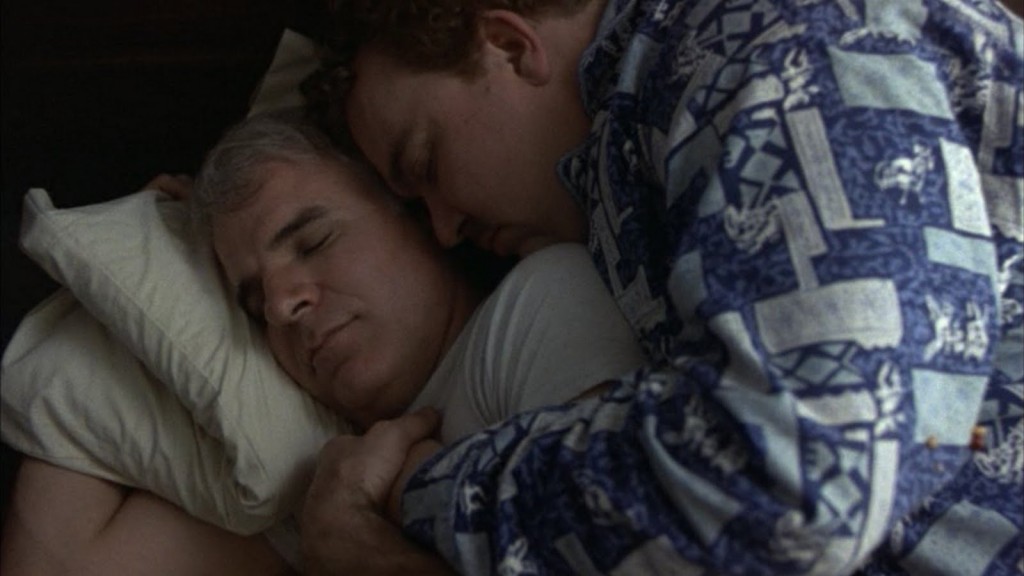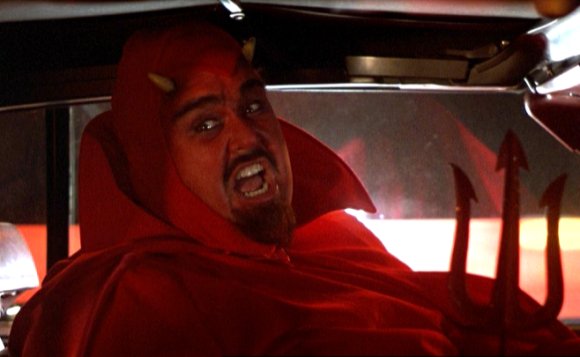Film is an entertainment medium that, by its very nature, tends to reward the viewer in rewatch. Sometimes movies even reveal to us how we’ve grown or changed since we last saw them. Our own Max Robinson reassesses old favorites, seasonal classics and the occasional oddball lost under the couch in his monthly column, Stale Popcorn.
My choice for this month’s column is a pretty interesting flick for a couple of reasons. For one, it’s one of the few John Hughes movies not centered around teenagers. For another, there just aren’t that many movies really about Thanksgiving. Planes, Trains and Automobiles has always held a place in my heart and I think that’s because, almost deceptively so, it’s an incredibly emotionally honest comedy. It’s also really, really funny.
Planes, Trains and Automobiles is a road movie, the kind of comedy that’s apparently pretty easy to screw up. Steve Martin plays straight man as stuffy ad exec Neal Page, who’s trying to get from New York to Chicago for Thanksgiving with affable but irritating shower curtain ring salesman Del Griffith (John Candy) along for the ride. Basically, it’s a movie of increasingly weird and terrible things happening to Steve Martin, who plays a pretty big asshole here.
Something I hadn’t really picked up before about Planes, Trains and Automobiles is how much it’s about social niceties. Hughes cues you into this with the movie’s opening, in which we watch Neal and his colleagues silently wait for their boss to finish clearing his throat and looking over paperwork so they can all leave. The movie is full of hyper-exaggerated gags and this scene is perfectly excruciating, going on for exactly the right amount of time. Page won’t say anything, of course. Then Page has to race another yuppie (a cameo from Kevin Bacon, who’d go on to star in Hughes’ next movie, She’s Having A Baby) for a cab to the airport in a fun bit that is tonally identical to the chase scene that ends Ferris Bueller. Undeterred, he attempts to literally buy another man’s cab away from him, which ends with him losing the cab and seventy-five bucks. Again, what makes this so funny is that Neal Page is an asshole who places “manners” and his own needs above everyone else’s. He may have been polite about it, but trying to buy someone else’s cab ride from them on the night before Thanksgiving is still an asshole move.
Candy’s Del Griffith is the perfect foil for Page, a genuinely nice dude who’s also clueless when it comes to social boundaries. Every time something bad happens to Neal, Del’s at least partially responsible for it, whether it’s inadvertently stealing his cab in New York, talking his ear off on a flight, or mistaking his ass cheeks for two warm pillows when they have to share a bed at a dive-y motel. When the stress of the trip becomes too much for Neal, he loses it and dresses Del down:
You know everything is not an anecdote. You have to discriminate. You choose things that are funny or mildly amusing or interesting. You’re a miracle! Your stories have NONE of that. They’re not even amusing ACCIDENTALLY! “Honey, I’d like you to meet Del Griffith, he’s got some amusing anecdotes for you. Oh and here’s a gun so you can blow your brains out. You’ll thank me for it.” I could tolerate any insurance seminar. For days I could sit there and listen to them go on and on with a big smile on my face. They’d say, “How can you stand it?” I’d say, “‘Cause I’ve been with Del Griffith. I can take ANYTHING.” You know what they’d say? They’d say, “I know what you mean. The shower curtain ring guy. Woah.” It’s like going on a date with a Chatty Cathy doll. I expect you have a little string on your chest, you know, that I pull out and have to snap back. Except I wouldn’t pull it out and snap it back, you would. Agh! Agh! Agh! Agh! And by the way, you know, when you’re telling these little stories? Here’s a good idea: have a POINT. It makes it SO much more interesting for the listener!
Del’s hurt response to Neal’s rant is a really profound, really vulnerable character moment and one of the best line deliveries of John Candy’s career:
You wanna hurt me? Go right ahead if it makes you feel any better. I’m an easy target. Yeah, you’re right, I talk too much. I also listen too much. I could be a cold-hearted cynic like you…but I don’t like to hurt people’s feelings. Well, you think what you want about me. I’m not changing. I like…I like me. My wife likes me. My customers like me. ‘Cause I’m the real article. What you see is what you get.
Planes, Trains and Automobiles works because it supports the wacky “we’re on the road” hijinks with strong scenes like this one. Del knows he’s annoying but he’s also 100% genuine, even to a stranger who dislikes him, because that’s who he is. The movie makes it clear that Del at least believes this, but it isn’t totally true. At one point, Del passes off shower curtain ring samples as earrings to make some quick cash. Worse, Del’s lying to himself and to Neal when it comes to his wife, Marie. We only see Marie as a framed photo on Del’s motel nightstands. Throughout the movie, Del talks about Marie frequently and in the present-tense. It’s only when Neal finally makes it back to Chicago that he figures out that something isn’t right and turns around. When Neal confronts Del at the train station, Del finally admits that his wife has been dead for eight years. Neal has a home and a family in Chicago, but Del doesn’t have anyone. We never learn where he’s from or where he’s going. He only has the road. Faced with all this, Neal invites Del to spend Thanksgiving with his family. After spending the movie playing an unlikable heel, Martin really sells this moment of Neal putting aside his own interests to help someone in need.
Flat out the best scene in the movie, though, is Neal’s “fuck”-filled, angry tirade at a perky rental car agency counter lady (Hughes movie mainstay Edie McClurg). This is the only moment in the movie in which Steve Martin gets to really let loose with his comedy chops and it’s awesome. Here’s the entire exchange in its entirety. You really have to admire how good the punchline is:
Planes, Trains and Automobiles is also a surprisingly well shot film. Cinematographer Donald Peterman (who was nominated for an Academy Award for his work on Flashdance) loads this movie with beautiful establishing shots. When we see a train crossing a bridge, the camera is placed inches above a stream so it’s looking up at the bridge. It’s a quick shot, but it adds a little extra dimension to a movie that could easily just coast on being a solid comedy. Some cool trippy lighting and prop work also makes a scene in which Neal imagines Del as The Devil even funnier.
Unlike a lot of Hughes’ teen fair, which I find I resonate less with emotionally as I grow older (which is maybe how it should be), Planes, Trains and Automobiles really holds up for me as a sweet, funny movie about the weird human connections we make in transit.
On Twitter? Check out our Deadshirt Date Night live-tweet of Planes, Trains and Automobiles this Tuesday night, November 25th, at 8pm ET with the hashtag #DeadshirtDN. Have thoughts on this film or suggestions for future installments of Stale Popcorn? Post a comment below, or hit us up on Twitter or Facebook!





